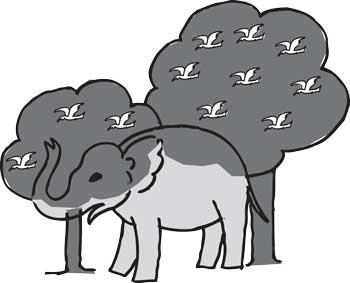Reply To:
Name - Reply Comment
In today’s digital, capitalist and globalized world, wildlife is symbolically in the wilderness with even the forest’s kings -- the elephants and the rhinoceroses -- being way down in the priority list for most countries though maintaining the delicate biodiversity is vital if we are to win the battle against climate change.
Next Tuesday March 3 is World Wildlife Day and the United Nations in a statement emphasises the incalculable value of wildlife. It says the animals and plants that live in the wild have an intrinsic value and contribute to the ecological, genetic, social, economic, scientific, educational, cultural, recreational and aesthetic aspects of human well-being and to sustainable development.

It is disappointing if not tragic that most people have zero concern for wildlife and biodiversity probably because they do not see it often and are not aware of the great value and the long term importance of animals and plants in maintaining a balanced environment which is vital for the world. We extract so much from nature but give back little in return, showing the selfishness of a wicked world. We need to reflect deeply on this and ask ourselves during this week how much we are giving back to Mother Nature which gives so much to us.
According to the UN, World Wildlife Day is an opportunity to celebrate the many beautiful and varied forms of wild fauna and flora and to raise awareness of the multitude of benefits that their conservation provides to people. At the same time, the day reminds us of the urgent need to step up the fight against wildlife crime and human-induced reduction of species. This has wide-ranging economic, environmental and social impacts. Given these various negative effects, sustainable development Goal 15 focuses on halting biodiversity loss. The theme of World Wildlife Day 2020, “Sustaining all life on Earth”, encompasses all wild animals and plant species as a component of biodiversity and the livelihoods of people, especially those who live closest to nature. This aligns with the UN sustainable development Goals 1, 12, 14 and 15, and their wide-ranging commitments on alleviating poverty, ensuring sustainable use of resources, and on conserving life both on land and below water to halt biodiversity loss.
Earth is home to countless species of fauna and flora – too many to even attempt counting. Historically, we have depended on the constant interplay and inter-linkages between all elements of the biosphere for all our needs; the air we breathe, the food we eat, the energy we use, and the materials we need for all purposes, the UN says. However, unsustainable human activities and over-exploitation of the species and natural resources are imperiling the world’s biodiversity. Nearly a quarter of all species are now at risk of going extinct in the coming decades. This is apocalyptic.
This year 2020, known as “biodiversity super year,” will host several major global events that place biodiversity at the forefront. It provides a unique opportunity to deliver transformative progress for the conservation and sustainable use of the species of wild animals and plants.
In a message to mark the event, UN Secretary General António Guterres says humanity is an inextricable part of the rich tapestry of life that makes up our world’s biological diversity. All human civilizations have been and continue to be built on the use of wild and cultivated species of flora and fauna. However, it seems humanity has forgotten just how much we need nature for our survival and well-being. As our population and our needs continue to grow, we keep exploiting natural resources -- including wild plants and animals and their habitats -- in an unsustainable manner.
In Sri Lanka, one of our major problems is that human elephant conflicts are rapidly increasing. Rangers and villagers are working to find ways to reduce conflicts and the devastating, at times deadly, impacts on both sides. In this and other ways we devastate biodiversity and we need to be aware that unless we repent and turn to a path of receiving and giving, we will endanger if not destroy humanity and Mother Nature.